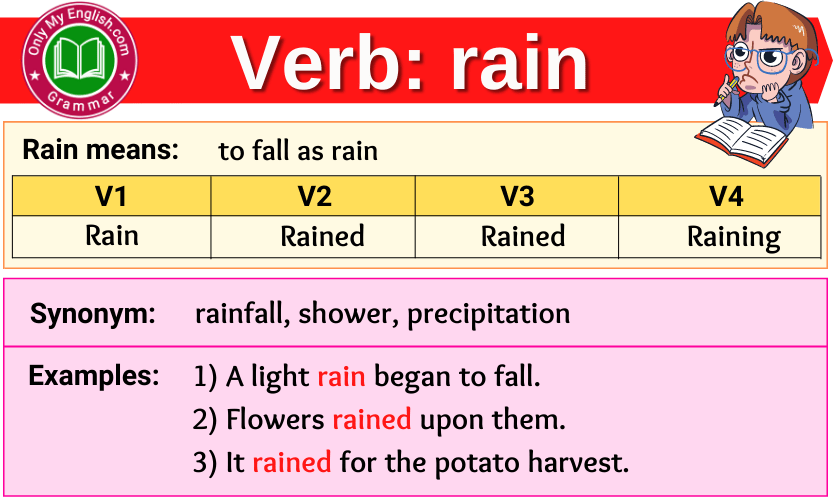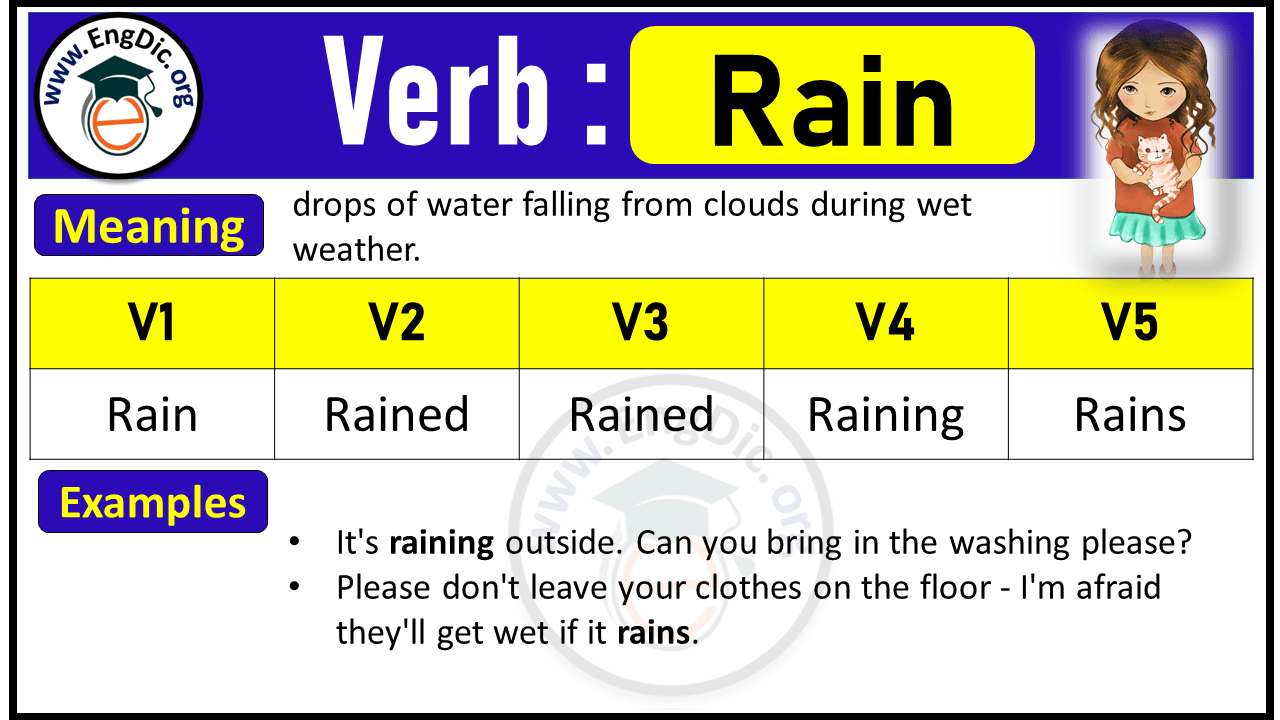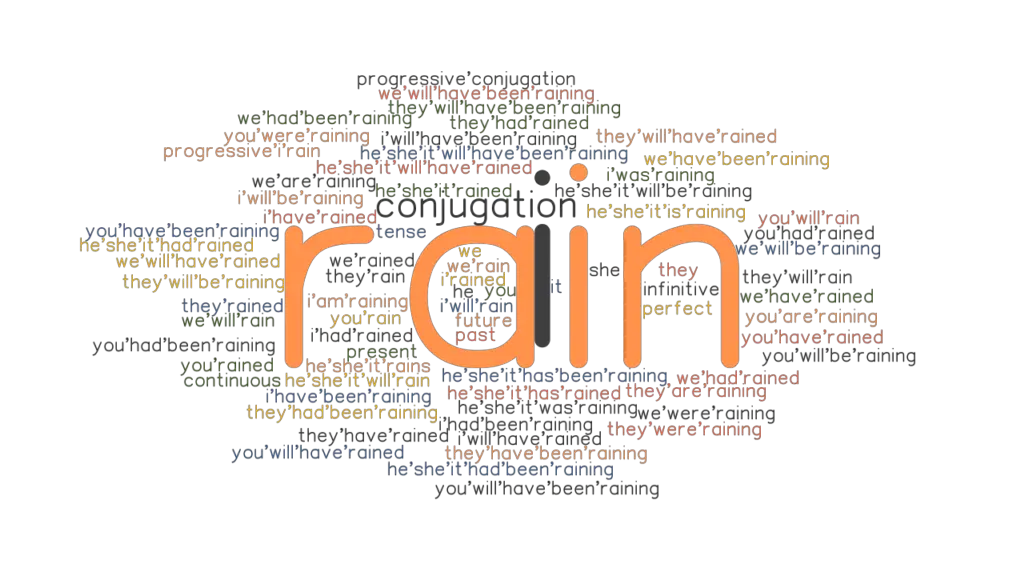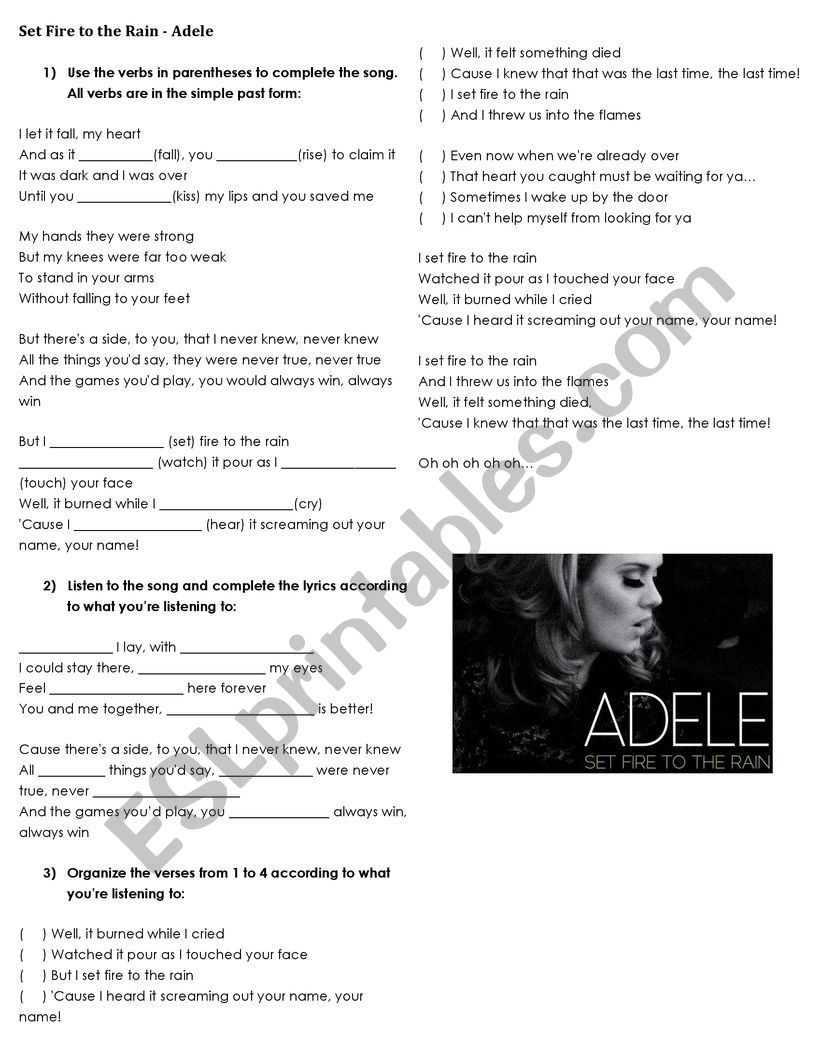
pastcont_simple презентація з англійської мови
Leave a Comment The past tense of RAIN is RAINED. See all forms of the verb RAIN with easy examples.

Conjugation Rain 🔸 Verb in all tenses and forms Conjugate in past, present and future
Infinitive Past rained Model : obey Auxiliary : have, be Other forms: not rain Contractions Advertising Indicative Present it rains Preterite it rained Present continuous it is raining Present perfect it has rained Future perfect it will have rained Past continous it was raining Past perfect it had rained Future continuous it will be raining

Rain Verb Forms Past Tense, Past Participle & V1V2V3 »
Rain means: moisture condensed from the atmosphere that falls visibly in separate drops, hail, pour, fall, mercy hailstorm Synonym Words For RAIN hail barrage deluge hailstorm waterworks rainfall deluge drizzle shower showers sleet stream fall flood hail mist monsoon precipitation torrent cloudburst condensation rainstorm

100 Strong Verbs List of Strong Verbs in English Pdf EngDic
Verb Tenses Past simple — rain in past simple rained (V2) . Future simple — rain in future simple is rain (will + V1) . Present Perfect — rain in present perfect tense is rained (have/has + V3) . Past Perfect — rain in past perfect tense is rained (had + V3) . rain regular or irregular verb? 👉 Is 'rain' a regular or irregular verb?

Verb Tenses in the Rain (FREE) Speech and language, Spring freebies, Spring speech therapy
Past tense of rain: the verb rain is a regular verb, i.e. we make its past tense and past participle form when we add -ed to the base form. The past form and past participle of rain are rained. The meaning, synonyms and forms of the verb rain are given below. Learn: Past Tense of Belong. Meaning: If it rains, water falls from the sky in drops

Rain Past Tense Verb Forms, Conjugate RAIN
past simple is used along with the past continuous where the former interrupts a longer action. (The latter.) Also, past continuous is also used to describe a scene. That day, it was raining. As for walk: I walked to the park = completed action in the past. I was walking to the park = action interrupted by another.

Conjugación Rain 🔸 Verbo inglés en todos los tiempos y formas Conjugar en pasado, presente y
Conjugation is the creation of derived forms of a verb from its principal parts by inflection (alteration of form according to rules of grammar). For instance, the verb "break" can be conjugated to form the words break, breaks, broke, broken and breaking. The term conjugation is applied only to the inflection of verbs, and not of other parts of speech (inflection of nouns and adjectives is.

Past Tense of Rain, Past Participle of Rain, V1 V2 V3 V4 V5 Form of Rain English Study Here
Conjugation of rain - English verb | PONS Verb Table for rain Continuous tenses Conditional Imperative Impersonal Simple tenses Present Past Present Perfect Past Perfect Will -Future Going to -Future Future Perfect Return to the dictionary Top of page Found an error? We appreciate your feedback. Click here! Continuous tenses Present Past

Rain Past TenseRain Present, Past and Past Participle Grammar Quiz
Past perfect tense of rain used to describe events that happened prior to other events in the past Past perfect continuous tense of rain used to describe events that began, continued, and ended in the past, emphasizing their relevance to a past moment Rain future tense Simple future tense of rain used for events to be completed in the future.

verbs to describe rain verbs rain voc ELT English language learning, English language
Rain past tense Rained Rained is the past tense of the word rain. Rain past participle Rained Rained is the past participle of the word rain. Rain verb forms V1 V2 V3 V4 Conjugation of Rain Simple / Indefinite Present Tense I rain. He/She/It rains. You/We/They rain. Simple Past Tense I rained. He/She/It rained. You/We/They rained.

Set fire to th rain Simple past tense ESL worksheet by AndreizaNunes
3 Answers 2 from verified tutors Oldest first Leonah English Tutor Experience - IELTS, OET, CAEL, CELPIP, TOEFL, CAE, FCE, C2, PTE, SAT, DIGITAL SAT, TOEIC, APTIS, GMAT, DUOLINGO. BUSINESS + TRAVEL ENGLISH, from BEGINNER 3 years ago Contact tutor 3 years ago Hi Mili. The past tense of "rain" is rained.

Rain Past Simple, Past Participle, V1 V2 V3 Form of Rain English Vocabs
Past Tense of Rain is Rained. Example: Sarah rained the toffies. Rain Past Participle: Past Participle Form of Rain is Rained. Example: Sarah has rained the toffies. Rain Present Participle: Present Participle Form of Rain is Raining. Example: Sarah is raining the toffies. Rain 3rd Person Singular: 3rd Person Singular of Rain is Rains.

Learn English with Carlo on Instagram “GRAMMAR Verb Tenses SIMPLE TENSES PAST It rained a
Present. I would rain. you would rain. he, she would rain. we would rain. you would rain. they would rain.

Tense Past Perfect Continuous Genlish
What is the past tense of rain? What's the past tense of rain? Here's the word you're looking for. Answer The past tense of rain is rained . The third-person singular simple present indicative form of rain is rains . The present participle of rain is raining . The past participle of rain is rained . Find more words! rain Similar Words poured

What is the present perfect tense of "it rains"? Learn english, Learn english grammar, Grammar
The past tense of "rain" is "rained." For example: Yesterday it rained heavily. It indicates that the action of raining has already happened in the past. In English, regular verbs typically form their past tense by adding "-ed" to the base form of the verb.

The Verb ' rain ' in Different Tenses / Le Verbe ' pleuvoir ' YouTube
What is the past tense of the word "rain" The past tense (past participle) form of "rain" is "rained." The infinitive of the word form is "rain." The present participle form is "raining." The past tense form is "rained" and past participle form is "rained." Understanding verb tenses The general grammar rules that govern past tenses are as follows.